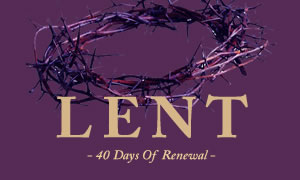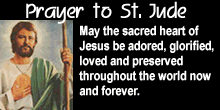


 Everybody has a tradition. The United States has a cultural tradition. Certain businesses have "traditions of excellence." Our English word "tradition" comes from the Latin traditio, meaning "a handing down." The Greek word used in the Bible both positively and negatively, paradosis, means the same thing as the Latin.
Everybody has a tradition. The United States has a cultural tradition. Certain businesses have "traditions of excellence." Our English word "tradition" comes from the Latin traditio, meaning "a handing down." The Greek word used in the Bible both positively and negatively, paradosis, means the same thing as the Latin.
Thus, whenever somebody learns something from someone else, tradition occurs. If you are a Christian, you have some type of tradition, whether it is the "Baptist tradition," "reformed tradition," or even the "anti-tradition tradition." Catholic and Orthodox Christians place special emphasis on Tradition, so much that we often call it "Holy Tradition." We say this because we believe that just as the Holy Spirit inspired the Bible, the Holy Spirit has guided the Church throughout history, and today, producing Tradition.
As a background, without the work of the Holy Spirit through the Christian Tradition, most churches would not be the same. We would not have a coherent doctrine of the Trinity. We would not have the Bible as we know it, since the Church chose the books that it contains (The Bible did not come with a Table of Contents). Even many other minor matters we often take for granted come from tradition: celebrating Christmas and sitting in pews. Thus, Tradition has influenced the way in which we view many doctrines, practices, and ethics. Even those in denominations that came from the radical Protestant Reformation (such as the Anabaptists) owe a large debt to Tradition, even though many are slow to admit it.
In opposition to Tradition, some quote Jesus when he says to beware of the "traditions of men." Jesus did indeed warn against manmade traditions, however, he also followed many of the Jewish traditions without question, including the Festival of Lights, which had its origins in the period during which the book of First Maccabees was written. St. Paul also had good things to say about tradition. He exhorted his readers to adhere to the written and verbal traditions that he and other Christians had received (1 Cor. 11:2; 2 Thess. 2:15, 3:6) (1).
Paul freely quoted from Jewish tradition that is not in the Bible, when he named the magicians in Exodus as Jannes and Jambres (2 Tim 3:8). Thus, the Bible distinguishes between good, Apostolic, Tradition and bad tradition. An analysis of early Christian writers shows that Scripture and Tradition were equally revered and seen to complement, rather than contradict, one another.
One early Christian writer, Papias (c. 150 AD), said he preferred the many oral traditions about Jesus to written books. We must remember that in the ancient world, very few people were literate. A sizeable number of Christians were probably illiterate, and the oral traditions would have been the normal means of communication for them. Also, since the Gospels were written between 60-100 AD, the Church relied heavily upon oral Tradition, namely the preaching and teaching of the Apostles and their followers, even before writing down the truths they knew.
Many Christians have been shaped by the Reformation tradition of sola scriptura, which views the Bible as the sole foundation of Christian belief, although to be accurate, the subjective interpretation of the Bible by the individual reader, a kind of tradition, plays a huge role. So many ask, "if scripture is the foundation, then how can tradition have a place?" In a sense the Scriptures have a place that later Tradition does not, since they are the earliest written testimony to God's activity.
However, we must remember that The Church is not static: she is a living. We are a part of the same Church that met in Jerusalem in the book of Acts, and that convened at Nicaea. As such, the Catholic and Orthodox Churches have never put up a wall between Tradition and Scripture, seeing Sacred Tradition and Sacred Scripture, then, are bound closely together, and communicate one with the other.
For both of them, flowing out from the same divine well-spring, come together in some fashion to form one thing, and move towards the same goal....the Church does not derive her certainty about all revealed truths from Scripture alone. Both Scripture and Tradition must be honored with equal sentiments of devotion and reverence (2).
Thus, the Church relies on Tradition and in a sense shapes the Tradition as she deals with new issues and heresies.
As the former quote suggests, Tradition and Scripture are a part of the same collective truth that the Holy Spirit preserves in the Church. Our foundation is not really Scripture, as the Reformers insisted, nor is it Tradition. Rather, our foundation is the Triune God (Father, Son, and Holy Spirit), who works through the Church, which employs Scripture and Tradition.
Even if we were to argue that the Bible somehow was the only authority, it too is a tradition, albeit a written and ancient one. Since the Scriptures are written Traditions, creating a dichotomy between Scripture and Tradition is like creating a dichotomy between sweaters and clothes, since sweaters are clothes.
As this article shows, those Christians in the Catholic and Orthodox Churches have never really pitted Scripture against Tradition. It strikes many non-Catholics as quite odd that a practice can be accepted simply because it is known through Tradition, even with minor Scriptural support. However, we must remember that no early Christian writer knew of the concept of Sola Scriptura, i.e. the Reformation principle of "Scripture Alone."
This does not mean we diminish the Bible's importance; it is a huge part of Church Teaching, and the reformers had good intentions when they emphasized the Bible's importance. However, we must keep the Bible in context: it was not bound and available on secular bookshelves until rather recently. It is and always has been the Book of the Church, interpreted by the Church in light of Tradition.
You may ask, "do you have to have Tradition to have the Bible?" Let me pose a few questions to you that explain why you pretty much have to have an authoritative Tradition if you have the Scriptures.
1. In the ancient world, how could a written text have been the only authority if very few churches, let alone, persons, could afford a copy of the complete Scriptures?
2. In the ancient world, how could a written text have been the only authority when the vast majority of Christians, lay and ordained, couldn't read?
3. In the ancient world, how could a written text have been the only authority if what constitutes the written authority was not clearly defined (since it took awhile for all churches to agree on what books constituted Scripture)?
4. Related to the above question, how could a written text be authoritative outside of a connection to Tradition, if Tradition itself determined which books made up the authoritative text?
5. In the Apostolic age, how could a written text have been the only authority if the text itself was not even written yet (since the first book of the New Testament was not written until around 20 years after Jesus' resurrection)?
6. In the early Church, how could the written text be authoritatively interpreted properly outside of Tradition if many groups were already misreading the texts even as early as the time of Saint Paul?
My basic point in asking these questions is that tradition is unavoidable, but it was especially unavoidable in the ancient world. Based on the questions I asked above, it is clear that the Church would not have survived if it were not for Tradition, and I believe that Tradition is one way in which Christ kept his promise that the gates of Hades would not overcome the Church. I seriously think a dissertation-worthy topic would be to compare the rise of Sola Scriptura movements to the development of the printing press, and I think you would find that the two just happen to go together.
Not only is tradition unavoidable, but as I touched on previously, the gospel never would have been spread without oral tradition, without the message of Christ, because the first book of the New Testament wasn't even written until 20 years or so after the resurrection of Jesus. In between this time, oral tradition was the main way the message of Jesus was spread. Additionally, even as early as the middle of the first century, Paul and others were writing to correct churches against various errors.
Many of these heretics were misreading the Scriptures of the time (the Old Testament), and misinterpreting the message of Jesus. Paul and others corrected these errors, but are we to assume that these errors, and the right of Christian leaders to correct these errors, suddenly stopped after 100 AD? To me, this does not make much sense, that somehow at 100 AD the authority of Christian leaders ended. I believe this is where the Church, the body of Christ, comes in: Tradition is the way in which the proper interpretation of the message of Christ (and of Scripture) is authoritatively preserved.
Keep in mind that not every local tradition is Holy Tradition, or a part of the Church's official teaching. If a practice or belief is only present in one region, then that is simply a local tradition, which can be good, neutral, or simply tolerable. In the Philippines, some Catholics nail themselves to crosses on Good Friday as an act of self-denial. This is merely a local tradition, and is in no way considered a part of Holy Tradition, although believing in the death and resurrection of Jesus is certainly a part of Holy Tradition.
In conclusion, Holy Tradition is the handed down truth of Christianity, which shapes the Teachings of the Church equally with Scripture. The Holy Spirit has preserved this truth, and guided the Church since its inception, using a variety of people, cultural contexts, and different languages to accomplish this task. Scripture is part of Tradition, and is the product of the same Spirit-Guided believing community that exists today. In a sense, we are a part of Tradition, as we in the modern Church, like the ancient Church, must address contemporary issues and problems.
Tradition enriches our theology, worship, and ethics by showing us the wisdom and inspired collective experience of the past. Tradition sets the boundaries between correct belief, and belief that is incompatible with the teachings and person of Jesus. Everybody has a tradition, so why not have the time-honored Tradition of the Church?
Footnotes
1.- 1 Cor: 11:2 (RSV): "I commend you because you remember me in everything, and maintain the traditions even as I have delivered them to you."
2 Thess. 2:15 (RSV): "So then, brethren, stand firm and hold to the traditions which you were taught by us, either by word of mouth or by letter."
2 Thess. 3:6 (RSV): "Now we command you, brethren, in the name of our Lord Jesus Christ, that you keep away from any brother who is living in idleness and not in accord with the tradition that you received from us."
Note that the New International Version (NIV) translation of the Bible renders the Greek word paradosis as "teachings" when the word is used positively, as in the passages mentioned here, yet translates the word as "traditions," when it is used negatively. These biased NIV translations give the impression that the New Testament takes a negative view of tradition.


I have been thinking a great deal about my experience at Reconciliation this past Saturday. I felt an intense and unexplainable urge to go and confess my sins when I woke up that morning. I try to go every six weeks or so, but this was no routine visit to the priest for me. I needed to unburden myself of the numerous venial sins I had committed since I last participated in this Sacrament.
Purest Gold: God's Refining Fire in our Lives »
After salvation, many young Christians wonder if there's anything more to their newfound faith than just the security blanket of "being a Christian." Time and time again, God shows himself as a "refiner," and our lives are as gold. God started leading me in this study to understand what He was doing in my life, as well as in the lives of others.
Picking up my pen to write this column, I couldn’t imagine how time flies. Since the last publication of this column I have gone through a lot, especially the loss of my dear mother to whom I dedicate this article. Not only her, but seems I lost a whole generation of my close family.
How to Achieve Business Excellence »
“Do you see a man who excels in his work? He will stand before Kings; He will not stand before unknown men.” Proverbs 22:29
Spiritual Development for our Youth »
Most of us youth in today's fast moving world are easily thrown off by difficulties and worries.
The theme of conversion is a thread that runs all through Lent, but conversion takes on different aspects throughout the phases of Lent. The first two and a half weeks focused on the interior turning of hearts; the liturgy urges the faithful to reflect and examine consciences thoroughly.
Saint Josephine Bakhita »
Feast Day: February 8
Patron Saint Of: Sudan
Saint Josephine Margaret Bakhita was born around 1869 in the village of Olgossa in the Darfur region of Sudan. She was a member of the Daju people and her uncle was a tribal chief. Due to her family lineage, she grew up happy and relatively prosperous, saying that as a child, she did not know suffering.
Catholics Must Fast More Intensely This Lent»
The Norbertine Canons of St. Michael's Abbey have created this digital Lenten retreat so that you can journey through this holy season alongside them. If you want to have one of your best Lenten seasons yet, join us in our Lenten Program "The Great Fast" - https://theabbotscircle.com/the-great-fast-join
When Your Faith Is Put to the Test - Bishop Barron's Sunday Sermon»
Friends, we come now to the Second Sunday of Lent, and we’re on both dangerous and very holy ground with the first reading from the twenty-second chapter of Genesis. The ancient Israelites referred to it as the “Akedah,” which means the “binding”: Abraham binds and is ready to sacrifice Isaac at God’s command.

Copyright © 2002-2024 THE BEACON INTERNATIONAL CATHOLIC MAGAZINE. All rights reserved.
another mc.rufus interactive web design